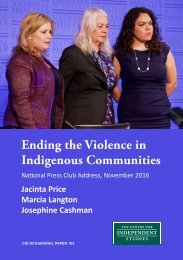Final Report Strong Fathers Strong Families Programme Descriptive Analysis
Final Report Strong Fathers Strong Families Programme Descriptive Analysis
Final Report Strong Fathers Strong Families Programme Descriptive Analysis
You also want an ePaper? Increase the reach of your titles
YUMPU automatically turns print PDFs into web optimized ePapers that Google loves.
• The timing of events/activities: employed men were generally unable to participate in daytimeevents, and evening events often coincided with family commitments. Notwithstanding this, oneorganisation ran its programme in the evenings so that all men had the opportunity to participate.A few organisations had developed relationships with other community organisations which helped themrecruit participants. For example, one organisation delivered the SFSF programme to participants in aresidential alcohol and drug facility, and commented that recruitment was not an issue as they had a‘captive audience.’ Another organisation was recruiting men that were subject to a Work andDevelopment Order issued by the NSW State Debt Recovery Office (see snapshot below).Difficulties recruiting participants tended to lessen as time passed and the SFSF programme developed aprofile in the community either through word of mouth or through its community networks. Someorganisations commented that participants were good ambassadors for the programme:We also picked the right guys to go on the first camp – they then came back and spread theword, which encouraged more men to attend the next camp.Most organisations accepted any Aboriginal and Torres Strait Islander man who was willing to participate,noting that grandfathers, uncles and brothers in addition to fathers played a role in the social andemotional wellbeing of children. A few sites had a more targeted or restricted approach to recruitment.For example, it was reported that one organisation was only recruiting men from a specific geographicarea. This site was also focused on recruiting young men in school (13-18 years) because it found youngmen easier than older fathers to engage:We have been targeting young men 13-18 year olds because they are easier to connectwith and engage. They are at schools and schools are welcoming and engaging. The boysare receptive to the programmes we have been doing. They have been receptive to thecamps and to the conferences. They have been coming to the family fun days. Older menhave been harder to engage –unless I’m walking down the street or going to the pub afterwork you are not going to get to them unless you have a group that can help you connect tothem …One organisation targeted two different groups of Aboriginal and Torres Strait Islander men, men withlow-medium needs who were functioning well but needed some social support, and men with higherneeds who needed extra support. This ensured the organisation accessed a broad section of thepopulation:We run two programs inside the SFSF – Men’s Health and Wellbeing program - where wedo an exercise program/fitness session and discuss nutrition, goal setting and conduct yarnup groups, and a higher needs section where we run workshops covering topics such asanger management, strengthening families, domestic violence, alcohol and drug abuse andbudgeting. We provide the men with a brief overview of what the services/programmes(relating to these topics) do and if men need extra support we refer them to theservice/programme.SNAPSHOT: RECRUITMENT: WORK AND DEVELOPMENT ORDEROne SFSF organisation is successfully recruiting men through the Work and Development Order (WDO)initiative of the NSW State Debt Recovery Office. WDOs allow individuals with outstanding fines to reducetheir debt through unpaid work with approved providers or through certain courses of treatment.This SFSF organisation is a WDO registered provider and men participate in SFSF events/activities as partof their WDO. Stakeholders report that the initiative has allowed them to engage with vulnerable or ‘hard toreach’ men who would never normally participate in a men’s programme.According to stakeholders, the SFSF programme has delivered many positive outcomes for these men,some of whom had reportedly not had a health check for over 10 years. While being engaged by the SFSFprogramme and learning about health and wellbeing, men subject to a WDO are also decreasing theoutstanding fines against them and regaining control of their lives. As an example, one man undertook 80-90 hours of programme activities, completed his WDO and obtained a vehicle so that he could access andOrganisations start re-engaging used a with range his children. of different Another strategies underweight to promote male gained the programme 14kg and is and reportedly recruit now participants. ‘aThese changed are summarised man’. in Table 5 below.URBISFINAL REPORT RESEARCH FINDINGS 13



